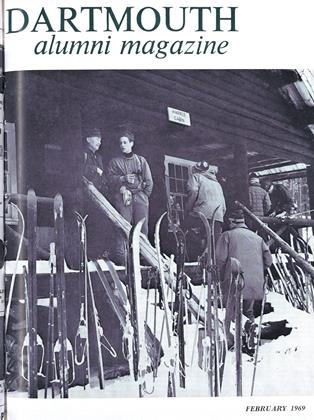By Barriss Mills '34.Lafayette: Purdue University Studies,1969. 199 pp. $6.75.
I have read this book straight through at one sitting because it seems to me different from the several indifferent translations of Martial currently available. Professor Mills has carefully selected a representative third of the epigrams, wisely sidestepped such pedantic pitfalls as imitation of the hendecasyllabics and elegiac couplets of his original, then given us a pungent and deft representation of Martial's First Century wit in the idiom and rhythm of the Twentieth Century. This literary legerdemain was learned, no doubt, in the author's previous translations of Theokritos and Catullus; it is a difficult and impressive feat.
The introductory essay indicates sufficient command of the voluminous scholarly literature devoted to Martial, but in addition there is evident a sprightly appreciation of the fact that reading Martial is fun. Hence the reader has before him a combination of scholarship and fun; this is a commodity currently in short supply.
Reading Martial is something like looking at Hogarth's pictures. Martial knew the art of walking the streets of his beloved Rome in much the same way as Hogarth understood the manners and customs of Eighteenth Century London. Martial had an eye for such things as Marriage a la Mode and The Rake's Progress, for high life and low life, for politics and for prostitution, and his sharp eye was never jaundiced, always twinkling. He is often bitter, never sour. Rome sometimes disgusts Martial but never bores him, and so he walked the streets of Rome, and so he has served as guide to those who in imagination have always walked the streets of Rome and has kept us from being lost in Ancient Rome — a tragic plight.
Could it be that even in our day this translation will lead others to practice this pleasant pastime rather than walking the streets of our own cities? Wouldn't it be safer? And isn't such a translation after all what we mean when we say The Classical Tradition? Is it even true perhaps that a citizen who has walked with Martial in Rome and with Hogarth in London will learn to walk other city streets with pleasure and with respect for others who wish to indulge in this gentle art? If this assumption is not true, what's the use of education?
But the best thing about this book is that it is amusing in a way that makes you (a) laugh and (b) wish you had said it. It's like a cocktail party with Voltaire, Horace Walpole, Will Rogers, and the Smothers Brothers — a wonderful party but bad for the ego. Poor Martial had to recite his epigrams in public and so did his competitors. Against one of his rivals he wrote, as Professor Mills puts it:
"Why do you wear a muffler around your neck when you recite?
We need it for our ears."
"Quid recitaturus circumdas vallera collo Conveniunt nostris auribus ista magis."
And to this day you don't need a muffler for your ears when Martial recites his poems about Rome because you know they are about us.
Mr. Stearns is Daniel Webster Professor ofthe Latin Language and Literature Emeritus,Dartmouth College.
 View Full Issue
View Full Issue
More From This Issue
-
 Feature
FeatureTHE UNSUNG HERO OF THE DARTMOUTH COLLEGE CASE
February 1969 By Susan Liddicoat -
 Feature
FeatureThe Bearing of the Green
February 1969 By Mary B. Ross ('38) -
 Feature
FeatureA Call for Equal Opportunity
February 1969 -
 Feature
FeatureA Student View of the Crisis, 1816-19
February 1969 -
 Article
ArticleTrustees and Alumni Council Meet
February 1969 -
 Article
ArticleThe Undergraduate Chair
February 1969 By CHRIS KERN '69
Books
-
 Books
BooksFIVE CUMMINGTON POEMS:
February 1940 By Edward Fritz '40 -
 Books
BooksTHE DAMNED WEAR WINGS.
By HERBERT W. WEST '22 -
 Books
BooksFOREIGN AID AND AMERICAN FOREIGN POLICY: A DOCUMENTARY ANALYSIS.
JANUARY 1967 By LAURENCE I. RADWAY -
 Books
BooksAMOS, THE BEAGLE WITH A PLAN.
May 1953 By Margaret W. Minnes -
 Books
BooksA PHILOSOPHER LOOKS AT SCIENCE.
MAY 1959 By R.W. CHRISTY -
 Books
BooksFOUNDATIONS OF EMBRYOLOGY.
JANUARY 1959 By W. W. BALLARD '28

